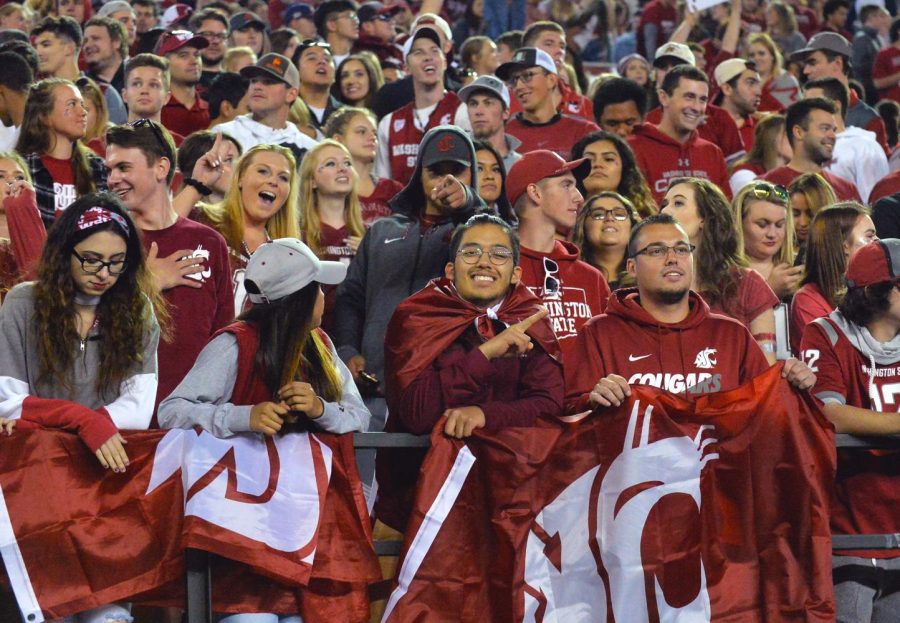Prioritize academics above athletics
WSU should be known better for its outstanding academics than its sports
JORDAN MAXWELL | Daily Evergreen File
WSU fans at the football game against the University of Southern California on Sept. 29. Although athletics attracts many new students, education should be the main reason students choose WSU.
October 12, 2017
College athletics departments dominate media attention, spend millions of dollars every year and are a major source of pride for college students and alumni. But to a large degree, the emphasis on sports often drowns out the importance of education in college life.
As a fan of Cougar athletics myself, I certainly don’t want to see college sports go away. Being a Coug fan is a special and unique experience entirely. But it sometimes seems that athletics are prioritized above academics.
Athletics dominates academics and other aspects of WSU in their level of promotion. Tammy Crawford, a WSU sport management professor, said that when one searches a university like WSU on the internet, athletic accomplishments are the first items that come up. Schools should push to raise awareness of the research and fields of study offered here, and make that the priority to raise awareness of the university brand, instead of simply boasting about a winning football team.
Another major issue regarding college sports is money. At WSU, the athletic department brought in over $58 million in revenue last year, according to Matt Kleffner, the senior associate athletics director. Yet none of that revenue goes toward improving the academic facilities and departments at WSU, despite the fact that academic opportunities should be the primary objective of any educational institution.
“Athletic success would have no impact on academic funding beyond the impact our success has on enrollment and exposure for the university,” Kleffner stated in an email.
Unfortunately, Crawford said that it is not realistic to expect the athletic department at a university, such as WSU, to give money to academic departments on campus, because of the “arms race” nature of college sports that puts pressure on school athletics programs to outspend each other.
“If you have somebody that says ‘we made $60 million this year, let’s put it into resources on campus,’ they are basically hurting themselves if they are trying to compete with that program that makes 200 million,” Crawford said.
Chief University Budget Officer Joan King stated that the Athletics budget was 22 percent of the budget for the academic units at WSU. Despite the huge amount of revenue sports bring in every year, last year the WSU Athletics Department closed the year with a $10 million deficit, according to The Seattle Times. The previous three years also presented similar deficits, all of which the university was forced to cover with their own money, dollars that could have supported a professor’s research or the creation of a new academic facility on campus.
But while simply cutting the athletic budget might seem like the easiest way to make academics and learning the forefront of WSU’s “brand,” Crawford said it isn’t realistic to expect college sports to shrink. Instead, the university should focus on marketing and emphasizing the research and wide variety of studies offered.
From an economic point of view, college sports, especially football gets loads of attention, earns big money and has a huge influence on college life, makes sense — fans and students simply have a high demand for sports.
But why should this excitement eclipse the academic focus of school? Why should students and faculty be told to work around sports schedules, only to hear that the athletics department needs money because they spent too much on fancy new facilities?
We should push the academic achievements of WSU forward, and invest, advertise and celebrate the amazing opportunities that one can have while attending WSU. In the end, this requires us to decide where priorities lie. Bring education back to the forefront of higher education.









